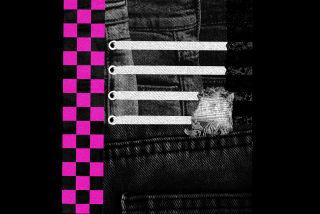Black History Production Bears Fruits of Tolerance
- Share via
TUSTIN — This was one of the more unusual days of Black History Month at Columbus Tustin Middle School: The tangerine took potshots at the cherries, the snobby grape sisters acted high and mighty, and everyone sexually harassed the peach.
It was a scene from “Discrimination Elimination,” a production written and staged Friday by members of a theater-arts class here. It was one of scores of activities in Orange County schools during February’s Black History Month.
At Columbus Tustin, where 6.3% of the students are black--a greater percentage than in most Orange County schools--students have been hearing daily announcements of facts and quotes from African-American history like this:
--Mathematician Benjamin Banneker once said, “The color of the skin is in no way connected with strength of the mind or intellectual powers.”
--Guion Stewart was the first black American astronaut to fly into space.
In a history class, students designed baseball-style cards of their heroes. Cynthia Cutno, 13, wrote on the back of a card showing Harriet Tubman, “Slave. Civil rights leader. Teacher. Storyteller. Preacher. Founded underground railroad, helped free thousands of slaves.” On the back of a card featuring Frederick Douglass, she wrote: “Slave. Writer. Teacher. Overcomer. Taught himself to write by copying letters marked on timber in the shipyard.”
In a novel approach to the lessons of history, the eighth-graders in Betsy Banyard’s theater-arts class used metaphor to show that discrimination victimizes and hurts everyone, not only members of racial and ethnic minorities.
The students portrayed pieces of fruit in a bowl about to be eaten. As their time of doom drew near, the tension mounted, descending into sniping, name-calling and bigotry. A pair of grape sisters bragged about their upstanding heritage. The tangerine insulted the cherries for being sour. The peach had to endure pinches, pokes and crass remarks.
The hostility escalated, peaking with the beating of the apple, who had been brave enough to confess his fear of dying. In the shocked fallout, the peach implored everyone to stop the madness and not judge others “by the tone of their flesh.”
In another segment of the play, the students stood in a line, their backs to the audience. Each then turned face forward and made a statement, trying to shatter stereotypes about blacks, Anglos, Asians, Latinos, Iranians, blondes, women, the overweight.
“Just because I’m a man doesn’t mean I’m not sensitive,” said one male student.
“Just because I’m black doesn’t mean I’m going to beat you up in the street,” said another student.
“Just because I’m blonde doesn’t mean I’m an airhead,” one girl said.
“Please see beyond what you see in front of you,” said a Korean girl.
In another part of the play, two students portrayed Martin Luther King Jr. and Coretta Scott King on their way to accept the Nobel Peace Prize. Pausing, King recounts to his wife a painful memory from childhood, when the mother of a white friend refused to let her son play with a black boy. They concluded the show with a dance about the ugly duckling, and how he was finally accepted by his peers after being shunned because of his appearance.
Planning a show for Black History Month, Banyard had suggested that her students perform a work about King. But they said that while brainstorming, they realized that they all had suffered from being judged unfairly because of the color of their skin, their weight, their religion, their hair color or some other aspect of themselves. They wanted to show that discrimination is “not just a matter of race,” they said.
Talking after the play, they shared stories of the pain of discrimination. Sang Le, 14, a Vietnamese-American, said that vandals sprayed the word nip across his aunt’s Santa Ana barbershop. Mason Moyer, 14, said a group of Latino students made fun of him during a basketball game, saying he had missed a shot because he is white.
Katie Turner, 13, said people tease her cruelly about her weight, saying she should go to India because “they appreciate cows there.” Evelyn Rojas, 13, whose parents are from Chile, said people call her a “Mexican” in a derogatory tone, ignorant of her cultural roots. Greg Carnal, who is black, said he once tried to break up a fight between white boys and they hurled racial epithets at him.
The students seemed to agree that Black History Month has taught them to try to refrain from making judgments about people. One black student, Myque Harris, said she realized something from listening to her peers talk about their experiences.
“I learned that all people discriminate and all people are discriminated against,” she said.
The eighth-graders said they are optimistic that the understanding they gained from looking at discrimination will stay with them even when Black History Month ends.
“You can’t put a date or a month on something so important,” said Richard Lacsamana, 14. “It should be something you do every day.”
More to Read
The biggest entertainment stories
Get our big stories about Hollywood, film, television, music, arts, culture and more right in your inbox as soon as they publish.
You may occasionally receive promotional content from the Los Angeles Times.










